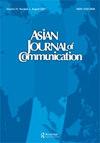算法时代的交叉曝光、感知现实主义和在线政治参与
IF 1.5
2区 文学
Q2 COMMUNICATION
引用次数: 1
摘要
摘要考虑到交叉曝光对算法时代民主审议的影响,本研究提出了一个概念模型,描述了感知现实主义和对算法策展的认可在交叉曝光和网络政治参与之间的关系中的作用。从台湾施政与传播研究所2018年全国调查中获得的二次数据被用来测试两者之间的关系。研究结果表明,跨领域接触与网络政治参与之间存在负相关。重要的调解模型进一步表明,在社交媒体上接触跨领域视角与网络政治参与呈负相关,表现为现实感下降。这种关联受到算法策展的认可程度的制约,这削弱了感知现实主义的负面中介作用。讨论了这些结果对未来研究的启示和方向。本文章由计算机程序翻译,如有差异,请以英文原文为准。
Cross-Cutting exposure, perceived realism, and online political engagement in the age of algorithms
ABSTRACT
Considering the implications of cross-cutting exposure for democratic deliberation in the age of algorithms, this study proposes a conceptual model that delineates the roles of perceived realism and approval of algorithmic curation in the relationship between cross-cutting exposure and online political engagement. Secondary data obtained from the 2018 national survey conducted by the Taiwan Institute for Governance and Communication Research were utilized to test the relationships. The results indicated a negative association between cross-cutting exposure and online political engagement. The significant mediation model further showed that exposure to cross-cutting perspectives on social media was negatively associated with online political engagement by way of decreased perceived realism. That association was conditioned by the level of approval of algorithmic curation, which weakened the negative mediating role of perceived realism as it increased. Implications of those results and directions for future research are discussed.
求助全文
通过发布文献求助,成功后即可免费获取论文全文。
去求助
来源期刊

Asian Journal of Communication
COMMUNICATION-
CiteScore
3.70
自引率
0.00%
发文量
38
期刊介绍:
Launched in 1990, Asian Journal of Communication (AJC) is a refereed international publication that provides a venue for high-quality communication scholarship with an Asian focus and perspectives from the region. We aim to highlight research on the systems and processes of communication in the Asia-Pacific region and among Asian communities around the world to a wide international audience. It publishes articles that report empirical studies, develop communication theory, and enhance research methodology. AJC is accepted by and listed in the Social Science Citation Index (SSCI) published by Clarivate Analytics. The journal is housed editorially at the Wee Kim Wee School of Communication and Information at Nanyang Technological University in Singapore, jointly with the Asian Media Information and Communication Centre (AMIC).
 求助内容:
求助内容: 应助结果提醒方式:
应助结果提醒方式:


